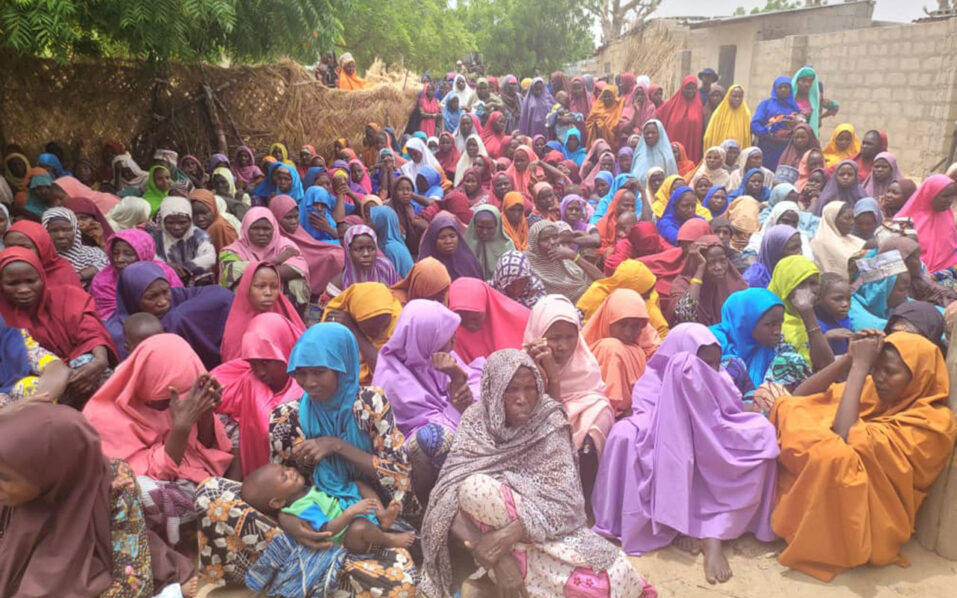
• Borno tops with 1.1m displaced Nigerians, 206,753 households, NBS reveals
•Over 63 per cent of IDPs excluded from education as livelihoods suffer
•40 per cent of rural displaced face discrimination, lack of clothing hits 97 per cent
•Safety concerns stall resettlement, Benue IDPs most eager to return
Borno State has been identified as having the highest number of internally displaced households in Nigeria, according to a survey conducted by the National Bureau of Statistics (NBS).
The survey, released yesterday, shows that Borno accounts for 206,753 out of the national total of 251,082 internally displaced households. The report also estimates that Nigeria is home to 1,134,828 internally displaced persons (IDPs).
The survey revealed that 83.4 per cent of IDPs have spent over four years in shelters or camps, while 12.4 per cent have been displaced for two to three years. Only 0.2 per cent have experienced displacement for a few days. The study, which covered seven states—Adamawa, Yobe, Borno, Sokoto, Katsina, Benue, and Nasarawa—highlighted the key challenges faced by displaced populations, including insecurity, lack of social cohesion, poor livelihoods, and inadequate access to essential services.
The displacement was primarily attributed to insurgency, banditry, and communal clashes, leaving many IDPs without adequate shelter, food, water, or healthcare. A significant proportion of the displaced population is unemployed, with many being minors.
Moreover, the survey found that 40.6 per cent of rural IDP households reported experiencing discrimination from host communities or camp workers, compared to 28.8 per cent in urban camps. Lack of clothing emerged as a critical issue, with 97.3 per cent of rural households and 62.6 per cent of urban households reporting inadequate access.
The data, collected using the International Organisation for Migration’s framework in September 2023, identified 340 camps across the seven states. Adamawa recorded 25 camps housing 3,284 households and 19,227 individuals. Borno, the state with the highest numbers, has 221 camps hosting 206,753 households and 877,299 individuals. Benue has 34 camps with 32,421 households and 187,513 individuals, while Nasarawa, Sokoto, Yobe, and Katsina recorded lower figures, with Katsina reporting just five camps housing 58 households.
The report also highlighted that 77.3 per cent of IDP households expressed a willingness to return to their original places of habitation, although safety concerns remain a significant deterrent. Approximately 50 per cent of respondents cited unsafe conditions as the main barrier to their return, while 43.3 per cent indicated they had no place to return to. Benue had the highest percentage of IDPs willing to return (90.4 per cent), followed by Borno (76.2 per cent) and Yobe (35.2 per cent). Rural households demonstrated a higher willingness to return (92.3 per cent) compared to urban households (54.3 per cent).
Furthermore, the survey found that 63.3 per cent of IDP households were aware of plans to provide psychosocial counselling before their return, with urban households (71.7 per cent) more informed than rural households (60 per cent). In Borno, 68.1 per cent of households reported better access to counselling services. However, safety concerns remain pervasive, with 71.1 per cent of households expressing apprehension about the security of their former areas of residence.
Among those who considered their former homes safe for return, 89.8 per cent acknowledged the government’s efforts to rebuild their communities. Despite these initiatives, many IDPs remain sceptical, with significant numbers opting for relocation or expressing fear of the unknown. The report underscores the complex challenges surrounding the resettlement of displaced persons in Nigeria, highlighting the need for comprehensive and sustained efforts to address the myriad issues affecting IDPs.
The executive summary of the report highlighted that internal displacement, defined as the forced relocation of individuals within their own country due to conflict, violence, natural disasters, or other crises without crossing international borders, constitutes one of Nigeria’s most critical humanitarian challenges.
The report identified multiple factors contributing to this displacement, including the Boko Haram insurgency in the North East, banditry and kidnapping in the North West, armed conflicts, and communal clashes across various parts of the country.
Conducted in 2023, the survey covered seven states: Adamawa, Yobe, Borno, Sokoto, Katsina, Benue, and Nasarawa. The findings reveal an estimated internally displaced population of 1,134,828 individuals and 251,082 displaced households. Borno State recorded the highest number of displaced households (206,753) and individuals (877,299), accounting for 77.3 per cent of the total surveyed population.
The report indicated that human-induced factors dominate the causes of displacement, with Boko Haram insurgency responsible for 81.2 per cent, farmers/herders clashes for 16.2 per cent, and banditry/kidnapping for 1.6 per cent. Natural disasters such as flooding play a comparatively minor role.
Demographic analysis revealed that minors under 18 years of age constitute 50.3 per cent of the displaced population, while adults aged 18 and above account for 49.7 per cent. Notably, 83.4 per cent of the displaced persons have been in their current situation for over four years. Gender distribution is relatively balanced, with males making up 50.5 per cent and females 49.5 per cent.
Educational attainment among the displaced population is notably low, with 63.4 per cent having never attended school and only 0.4 per cent achieving tertiary education.
The report also underscored the numerous challenges faced by internally displaced persons (IDPs), regardless of location. These include inadequate or non-existent healthcare services (89 per cent), insufficient food supplies (88.4 per cent), unreliable or absent power supply (87.8 per cent), inadequate clothing (83.6 per cent), and poor or absent toilet facilities (80.1 per cent). Additionally, 5.5 per cent of households reported abductions, while 6.0 per cent cited incidents of sexual assault.
Challenges within host communities exhibit significant disparities between rural and urban areas. In rural camps, 40.6 per cent of households reported experiencing discrimination by host communities or camp workers, compared to 28.8 per cent in urban camps. Similarly, 97.3 per cent of households in rural camps faced inadequate clothing, in contrast to 62.6 per cent in urban camps.
An assessment of the stability of the 36 host communities surveyed reveals that 66.7 per cent regarded their environments as stable and safe, except for communities in Sokoto State, which expressed contrary views. The report emphasises that stability and peace within host communities positively influence the IDP camps situated within them, making tranquillity a critical factor for establishing camps.
More than half of the host communities surveyed reported fair access to basic services, including housing, primary schools (58.3 per cent), healthcare facilities (63.9 per cent), markets (52.8 per cent), electricity (61.1 per cent), drinking water (66.7 per cent), farmland and fishing grounds (48.9 per cent), police presence (69.4 per cent), legal remedies (58.3 per cent), and social cohesion regardless of status.






